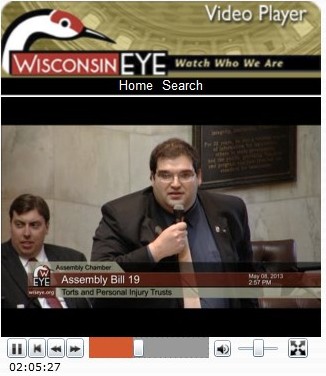The American Tort Reform Association (ATRA) has posted a story and video about the positive reforms contained in Assembly Bill 200 and the “Lemon Law King’s” opposition to them. Continue reading “Wisconsin Lemon Law Reforms Generating National Attention”
Month: May 2013
Assembly Introduces Lemon Law Bill
Rep. Bill Kramer (R-Waukesha) has introduced Assembly Bill 200, which will help bring Wisconsin’s lemon law back into the mainstream with a number of reasonable changes. Continue reading “Assembly Introduces Lemon Law Bill”
Assembly Advances Civil Justice Legislation
The Wisconsin Assembly today passed three bills, AB 19, AB 27 and AB 139, that will improve Wisconsin’s litigation climate, making Wisconsin a more attractive place to do business.
Video of the floor debate is available from WisconsinEye. Continue reading “Assembly Advances Civil Justice Legislation”
WSJ Examines Close Relationship Between Some Doctors & Asbestos Lawyers
A recent article in the Wall Street Journal (subscription required) reports on the close relationships between some doctors who treat mesothelioma patients, and the plaintiffs’ attorneys who litigate asbestos lawsuits.
The report details significant contributions to mesothelioma research made by some such attorneys, as well as some asbestos lawyers sending “elaborate gift baskets” to doctors, providing tickets to “professional sporting events,” or offering “paid work as expert witnesses.” According to the report, the doctors then serve as referrers and marketing tools, giving an edge to doctor-favored attorneys seeking to represent mesothelioma clients.
The article explains the cases are a hot commodity in the legal world because “Mesothelioma patients are in high demand by plaintiffs’ attorneys. A single successful mesothelioma case against companies that made asbestos products can be worth an average of $1.5 million to $2 million, according to legal consultants. The plaintiffs’ lawyers get anywhere from 30% to 40% in fees.”
Civil Justice Bills Headed to the Floor
The Wisconsin Assembly has scheduled a floor vote for Wednesday, May 8 on three bills that are a priority for the Wisconsin Civil Justice Council (WCJC).
- Personal Injury Trust Claims Transparency (AB 19): The purpose of this legislation is to provide transparency and prevent fraud involving personal injury trusts by creating certain discovery requirements during litigation. Numerous types of personal injury trusts have been created under the federal bankruptcy code and state laws to ensure that injured people can be properly compensated. In some instances, plaintiffs who file (or could file) claims with these personal injury trusts may also seek compensation for their injuries through a second channel – lawsuits against solvent defendants (i.e., businesses) in the courts. The ability of plaintiffs to seek multiple recoveries – without any transparency regarding these multiple recoveries – is what this bill addresses. For more information, see WCJC’s talking points. Also, click here to read a Wall Street Journal editorial discussing a similar law enacted in Ohio.
- Transparency in Private Attorney Contracting (TIPAC) (AB 27): The interests of private plaintiffs’ attorneys are not always aligned with the interests of a state and its citizens. Private plaintiffs’ attorneys who are given complete control of litigation may seek settlements and judgments that maximize their profit rather than the benefit to a state and its citizens. And private attorneys have received excessive fees for their work on behalf of states in some cases. This legislation ensures that consumers, victims, and taxpayers receive their fair share of any recovery. For more information, see WCJC’s talking points. Also, click here to read a Wall Street Journal article discussing similar legislation that has been enacted in other states.
- Physician Informed Consent (AB 139): This legislation clarifies a negative Wisconsin Supreme Court decision (Jandre v. Wisconsin Injured Patients and Families Compensation Fund) dealing with a physician’s duty of informed consent.
For more information about each of these bills, see WCJC’s website. Please contact Bob Fassbender or Andy Cook with any questions.
Legislature Considers Lemon Law Reforms
A coalition of vehicle manufacturers and dealers, including Hamilton Consulting clients, are supporting a Lemon Law reform bill being circulated by Sen. Jerry Petrowski (R-Marathon) and Rep. Bill Kramer (R-Waukesha). Continue reading “Legislature Considers Lemon Law Reforms”

